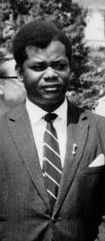Oscar Kambona
Oscar Kambona | |
|---|---|
 | |
| 1st Minister of External Affairs | |
| In office 1963–1966 | |
| President | Julius Nyerere |
| Succeeded by | Chedial Mgonja |
| Personal details | |
| Born | (1928-08-13)13 August 1928 Mbinga District,  Tanganyika Tanganyika |
| Died | 3 June 1997(1997-06-03) (aged 68) London, United Kingdom |
| Resting place |  Tanzania Tanzania |
| Nationality | Tanzanian |
| Political party | TADEA |
| Other political affiliations | Tanganyika African National Union |
| Spouse | Flora Moriyo |
| Children | Mosi Neema |
| Alma mater | Middle Temple |
Oscar Salathiel Kambona (13 August 1928 – 3 June 1997[1][2]) Was the first Minister of Foreign Affairs of Tanganyika from 1963 to 1966. He was born on the 13th of August, 1928, in the village of Kwambe, located near Mbamba Bay on the shores of Lake Nyasa in the Nyasa district near Songea, Ruvuma region, South Tanganyika, which is now part of Tanzania. He later died in London on June 3, 1997.(age 68 years)
The son of the Reverend David Kambona and Miriam Kambona, Kambona's father was among the first African priests to be ordained into the Anglican Church of Tanganyika. He received his elementary school education at home taught by his parents and uncle, all of whom were teachers. Kambona was then sent to St. Barnabas Middle School in Liuli, Southern Tanganyika, near his home. He subsequently attended Alliance Secondary School in Dodoma, Central Tanganyika.
Due to financial constraints, Kambona's father could not afford to pay for his education but through his reputed eloquence in reciting the Lord's Prayer in English, he is said to have persuaded a British Anglican bishop into sponsoring his schooling. He was then selected to attend Tabora Boys’ Senior Government School, where he first met Julius Nyerere, future president of Tanganyika, at the time a teacher at St. Mary's, a Catholic school in Tabora town.
Political career


Kambona became the secretary-general of the Tanganyika African National Union (TANU) during the struggle for independence and worked closely with Nyerere, who was president of TANU, the party that led Tanganyika to independence. Tanganyika secured independence from Britain on December 9, 1961.
In February 1967, Tanzania adopted the Arusha Declaration, an economic and political blueprint for the transformation of Tanzania into a socialist state. Kambona was opposed to this fundamental change and argued that the government should first launch a pilot scheme to see if the policy was going to work on a national scale.
Tony Laurence states in his book The Dar Mutiny of 1964, published by Book Guild Publishing, that, fearing for his life, Kambona went to live in exile in Great Britain with no financial support and took a number of low-paying jobs to support himself and his family.
References
Sources













